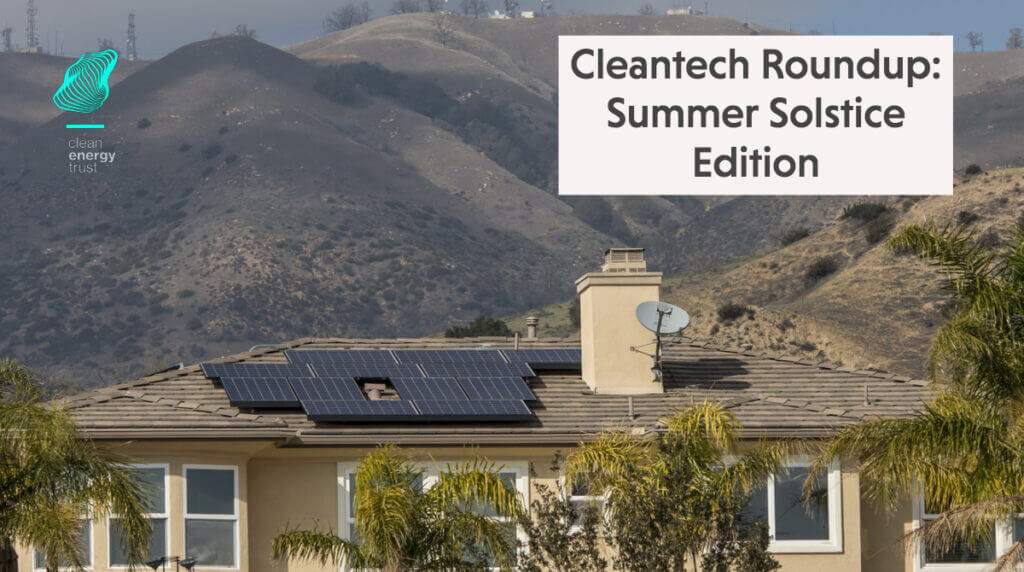
Credit David Paul Morris/Bloomberg
California Will Require Solar Power For New Homes
California mandated rooftop solar on new residential construction. Many applauded this as an important step in encouraging the deployment of renewable energy, and an example of an ‘every little bit helps’ move. While I like renewable energy, I’m skeptical that this will be a net positive — I envision blowback from this decision as consumers are annoyed by increased housing construction costs; I think the general public is not well educated on solar power to begin with, and it would be a shame if the new conventional wisdom becomes “solar makes things more expensive.” Additionally, rooftop solar is about 3 times as expensive as utility-scale solar, so if you want to move the needle, it’s not clear this is an effective way to do it.

Illustration: Rebecca Zisser / Axios
Female Founders Face VC Funding Cliff
Kia Kokalitcheva at Axios wrote on how female startup funders face long odds when it comes to raising follow-on funding for their businesses.
My colleague Dr. Ben Gaddy noted that this article highlights how pernicious this problem is. Minority and female founders tend not to receive follow-on funding, so that adds financing risk, so funders are more likely to pass in the future — a vicious cycle. He offers up a solution as well, borrowed from private equity firm Warburg Pincus: raise a large fund and commit to funding any company you invest in all the way through to exit, with milestones for future funding. Not only do you eliminate this bias-based financing risk, but you also end up investing where others aren’t, so you get great dealflow.
Startups need to do diligence, too
Eamon Carey from TechCrunch emphasized the importance of startups doing diligence on investors, not just the other way around. He made important points we generally agree with, with a couple exceptions.
The post highlights way-too-low valuations as something to be concerned about, but my colleagues and I think that way-too-high valuations are actually more of a problem. If you raise funds at a high valuation from angel investors, you might prevent dilution, but you may also prevent a serious venture capital shop from making an investment on those terms — they will either pass on the deal altogether if it’s too expensive, or dictate terms at a much lower valuation down the road.
Carey also suggests you shouldn’t bother with multi-year financial projects because they’re going to be wrong. I think that’s like saying you shouldn’t pick up your room because it’s going to get messy again anyways. We fundamentally disagree with that advice: early-stage companies should absolutely be able to model out their major revenue and cost drivers and fill in any unknowns with some basic research and reasonable assumptions. The point is not that each figure is correct; the point is that an investor is able to understand what assumptions are being made in a set of financial projections and adjust accordingly. Additionally, while startups typically lose money to start with, developing a robust set of projections can help demonstrate how the business will actually be able to make money once it has reached scale.
In the words of W. Edwards Deming, “In God we trust. Everyone else bring data.”
Respol to End Pursuit of Oil Growth
Spanish energy company Respol has decided to no longer attempt to grow its oil and gas business as it prepares for the global transition to cleaner energy. While the company is not going to stop selling oil and gas any time soon, this is a big deal — it reflects how strategic decisions at large corporates are being influenced by the changing political and technological landscape.
Tesla Model 3 Gets CR Recommendation After Braking Update
The Model 3 had poor braking performance, so Consumer Reports declined to recommend the vehicle. Tesla responded by flashing an update to the vehicle’s software, which led to an improvement significant enough for Consumer Reports to change its recommendation.
I’m less interested in whether Consumer Reports is recommending a specific electric vehicle than the innovation that occurred with Tesla’s over the air update, altering how the vehicle performed at a fundamental level. This kind of thing didn’t use to happen — it’s a reminder of how vehicles today are computers on wheels, and how this will become increasingly the case as we move to a connected and electrified future for vehicles (whether or not it is autonomous).
For Further Reading:
These publications and newsletters are what I typically pay attention to and are great sources for cleantech and investing news.
Energy:
- GreenTech Media — Good source for news and analysis on all kinds of clean energy.
- Axios’ Generate — Daily energy news roundup, with coverage that includes (but is not limited to) federal goings-on
- The Energy Gang Podcast — weekly cleantech news digest podcast produced by Greentech Media
Investing and Technology:
- Benedict’s Newsletter — Ben Evans’ weekly summary of interesting tech and investing news, along with his own interesting takes
- A VC — Blog by Fred Wilson of Union Square Ventures — lots of interesting commentary on venture investing in general, and blockchain in particular
- Fortune’s Term Sheet — Weekday morning newsletter by Polina Marinova